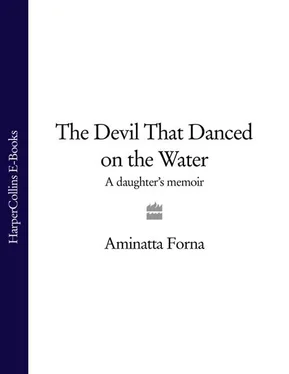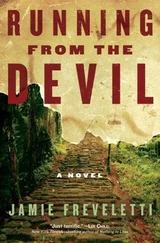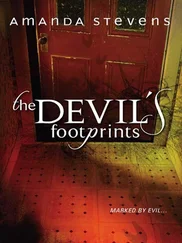He saw it, too. He rubbed his face, yawning widely. ‘Cockroaches,’ he said, and he turned to go back to bed.
My father’s feet had strong, yellowish soles. He told us that he didn’t own a pair of shoes until he went away to secondary school, and up until that time he had to walk five miles to classes and back again. This deeply impressed us, at the first telling. I disliked wearing shoes and at first I assumed the story’s purpose was to let us know that shoes didn’t matter. After all, my father managed without. Both of us had the same broad, long, flat feet: African feet. While I was growing my feet shot out first, ahead of the rest of my body. By the time I was eleven they were size seven and I barely cleared five foot. I was an L-shaped child.
In fact, our father’s story was a multipurpose parable with ever-extending dimensions of meaning. At its very simplest it was a warning against the dangers of catching hookworm by wandering outside without shoes on. I learned that one the hard way. They burrowed through the skin on the soles of my feet and made a home in my bowels.
Then the story was an inducement to be grateful for what you had. My father grew up in the villages, where life was very harsh indeed. There were no hospitals and very few schools. When Ndora, my grandmother, was sick the family had to take her all the way to Rotifunk, on the other side of the country, where there was a mission hospital. In Freetown there were several hospitals to serve the British administrators and their Creole civil servants, but these were not open to people from the country. They walked most of the way, carrying pots of food and sleeping mats on their heads. When they got to the hospital, amenities there were so basic that the doctors could not come up with a diagnosis. So they shrugged and sent her away, telling the relatives to bring her back if she got any worse. As if that were possible.
Five months later she died, leaving a six-month-old baby girl and her two beloved boys. Our father was five years old then. That evening as he was sitting among the men at the back of one of the houses he heard a high-pitched, rhythmic wail coming from the street. It was a Bondu elder, speaker for the secret society of women, and she was holding a broom up to the sky. That was the sign that one of the village women had died. A fragment of her song came across: ‘…the one from Rothomgbai’ – my grandmother’s village. Then he knew Ndora was gone.
Soon afterwards, our father ended up being the only person in his entire family to go to school just because his mother had died. The missionaries had opened a school nearby in Mamunta. The days passed and nobody came to enrol their children in the new school, so the missionaries approached the chief, who listened to what they had to say and then passed an edict: each household from the villages neighbouring Mamunta would volunteer one child to the new school. None of the women wanted her son to be chosen. People were very suspicious of education back then; they said that people who went to school never came back. With no mother to defend his interests my father was elected to go. Fourteen years later, when he left for Britain to become a doctor, he thanked them and they were pleased they were right. See, they said, he’s leaving for ever, as we knew he would. This was the final meaning of my father’s story: it was about the value of education and not shoes at all. Do well in school and thank God you had an education, because lots of people don’t even know its value.
In fact the new school was closed within the year after the head teacher was caught having an affair with one of the paramount chief’s wives. The headmaster was fined, which was the correct punishment. But the cuckolded chief wasn’t satisfied and he closed the school down as well, saying that there would be no more white man’s education in Mamunta. Privately Chief Masamunta, who was also my father’s uncle, arranged for his own two sons and his nephew to be transferred to another mission school in Makeni some miles away.
My mother didn’t have African feet like ours. She had European feet. They were similar in the sense that they were quite big, but the arches were high and the soles smooth and thin and pale as paper. I had my father’s feet but, on the matter of cockroaches, my mother’s western sensibilities.
Gradually the cockroaches moved on as we swept the house out, washed cupboards down and covered the thick green and blue gloss on the walls with white emulsion. We hired a local man to help us with the work, and under our mother’s instruction he cut down branches from the trees and pushed them into the earth around the edges of the compound to protect the house from the churning dust of the road. When the rains came the branches flourished miraculously and our house was enclosed in an elegant screen of trees; we were all astonished and delighted, my mother as much as the rest of us.
My father bought iron beds and mattresses for the maternity ward and my mother donated my cot for the newborn babies. Within a very short time word got around that the clinic had opened and new patients began to arrive; every day the line of people trailed out of the waiting area and onto our veranda.
Our father worked ever longer hours. He ran two clinics in the centre of town – one for prescriptions, the other for minor surgical procedures: cataracts, circumcisions and the like. He tried hard to persuade people to bring their boys to him, instead of cutting the foreskin the traditional way, by a cleric or medicine man who tugged on it three times before slicing the skin off with an unsheathed blade. Certain days were set aside for circumcisions and sometimes fathers arrived from the countryside with six or seven boys of different ages. The obstetrics clinic was at the house, so my father could be on hand for those women whose babies came at night.
There was no nurse, so our mother helped. She held the women’s hands while they were in labour, especially the Fula women, who had to endure childbirth in silence. They were also supposed to give birth alone and by the time their relatives forced themselves to break their own traditions and bring them to the clinic the women often didn’t make it. Other times my mother monitored heart and blood pressure when an anaesthetic had to be administered; often my father just wanted my mother to stay in the room for propriety’s sake, so few of the women had ever been to a gynaecologist before.
When she wasn’t helping out in the clinic, or in her part-time job at the Volkswagen franchise in town, my mother sang: ‘“Dance, then, wherever you may be, I am the Lord of the Dance,” said he.’ Her mighty voice was the loudest, purest sound I had ever heard; it ran through my body with a shiver, like a cold drink on a hot day. She sang sitting cross-legged with her guitar balanced on her knee, in a cotton dress she’d made herself, hair hanging loose.
We sang too, after a fashion, like three baby crows gathered around a songbird: ‘I danced for the scribe and the far-thest-seas, but they would not dance and they would not follow me.’
She could practically sit on her hair; it was thick, naturally bleached by the Tropics and people in Sierra Leone marvelled at it. One of my aunts thought she must iron it straight and asked to borrow her hot tongs. My father used to have fun taking several strands and tying them into a knot to demonstrate how they unfurled in an instant, sliding like wet ice across glass. The trick was quite a crowd-pleaser among our African relatives, who came forward one at a time and asked to touch it.
Years later, when she no longer lived with us, her hairstyles became the test of memory between us children. ‘Can you remember Real Mum when her hair was long?’ we asked each other. Around the time she and my father split she cut her hair short. If you remembered her when she pulled it into a doughnut shape on the top of her head, or let it dry in crinkly waves down her back, then you remembered a time when our parents were together.
Читать дальше












